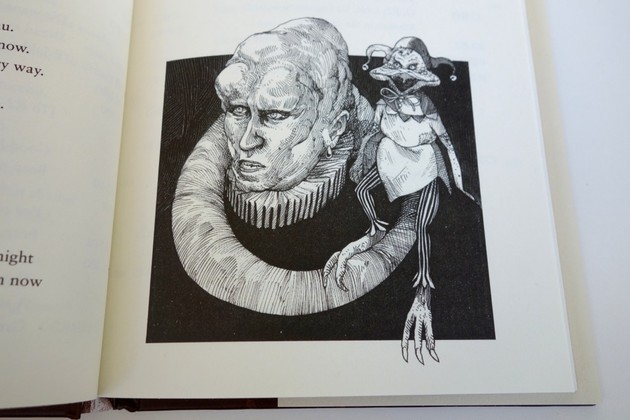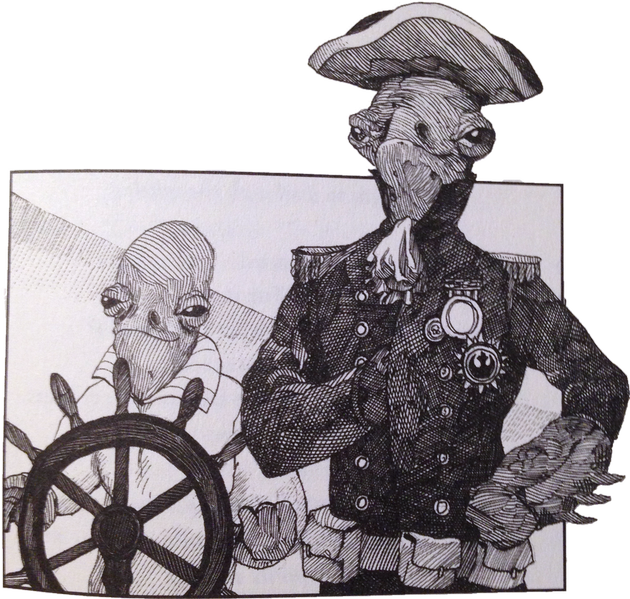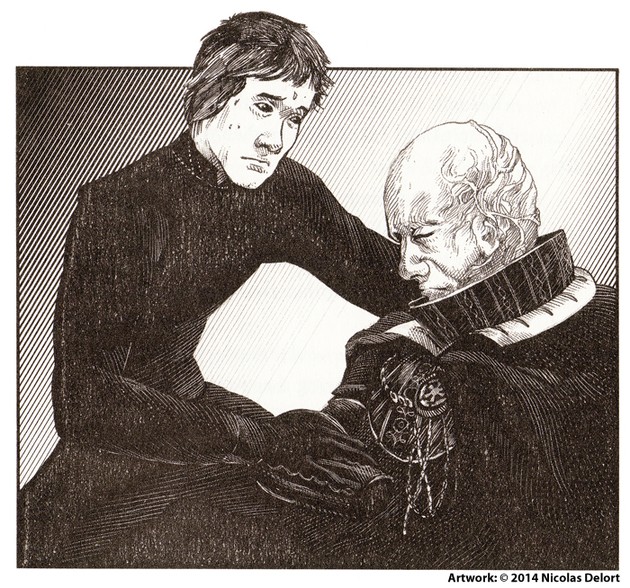William Shakespeare’s Star Wars: The Jedi Doth Return (9 out of 10) Written by Ian Doescher, illustrated by Nicolas Delort, published by Quirk Books 2014.
May the Bard be with you, Ian Doescher.
Happily, the bard is with Doescher, as he completes the original Star Wars trilogy with “The Jedi Doth Return.” The first two books in this delightful series, “Verily, a New Hope” and “The Empire Striketh Back” are probably my favorite new Star Wars tie-in products in the last ten years. Doescher takes the scripts from the films and adapts them into Elizabethan verse, mimicking Shakespeare using iambic pentameter and soliloquies and uh…other words I learned in high school but haven’t used since.

“The Jedi Doth Return,” as with “Return of the Jedi,” is something of a letdown for me; the height of the original trilogy is “The Empire Strikes Back,” and from that climax, we only have the loose ends of the saga to wrap. That said, the family dynamics of the Skywalker clan are more Shakespearean than most others in pop culture, and lend themselves well to the format. Darth Vader being (spoilers) Luke’s father, Luke and Leia being (spoilers) brother and sister…they’re twists that the Bard of Avon would have used, and probably did at some point.
I appreciate the soliloquies most.
As with the other books in this series, I appreciate the soliloquies most. These speeches, spoken as asides during a play, give insight into the deepest thoughts and motivations of characters who may have had only one line–or none–in the films. The Rancor Keeper in Jabba’s Palace, who we see weeping after Luke brings the portcullis (bonus vocab points!) down onto the beast’s head, earns a full-page, speaking about how he raised the rancor from a pup, and how cherished the pet was. I almost teared up reading it. Princess Leia, a character who I think gets short shrift in “Jedi,” is able to speak more her mind and be more involved in this book than she is in the actual script. On Endor, as they’re readying an attack on the Imperial shield generator:
“Such enterprise of pith and moment, yet
Here are we by these furry creatures led.
What unexpected allies! Aye, what strange
But needed friends these noble scamps may prove.
There is a saying back on Alderaan–
Or rather, should I say, there us’d to be
For now no sayings there are heard at all–
‘There should for no one greater welcome be
Than one who is an unexpected guest.’
So do we welcome these small ones unto
Our great and just Rebellion, these who are
Both meek and full of childlike eagerness.”
I love the sentiment, I love the insight into Leia’s character, I love the depth that it brings to the moment. Emperor Palpatine, already deliciously wicked in the film, is made even more despicable here. Admiral Ackbar, most famous now for That One Line, earns more dialogue, and becomes a source of comic relief. It was only after several sentences that I realized Doescher has all of Ackbar’s lines end in words with “ap” at the end. Chap, map, cap…so by the time he gets to That One Line, it was like the culmination of his entire character. Triumphant, beautiful, after all the memes, all the t-shirts, all the jokes that even non-Star Wars fans get–Doescher made that moment shine again.

That’s what I love about this entire series. I mean, I love Star Wars as much as the next guy who uses “JediKermit” as part of every online screen name and handle and nickname. And I probably love Shakespeare and Elizabethan English more than many of you. But reading Doescher’s take on my favorite movies has taken a story I know better than my own life story and made me reexamine it. I love him for it.
May the Force be with you, Ian Doescher.

William Shakespeare’s Star Wars: Verily, a New Hope
William Shakespeare’s Star Wars: The Empire Striketh Back